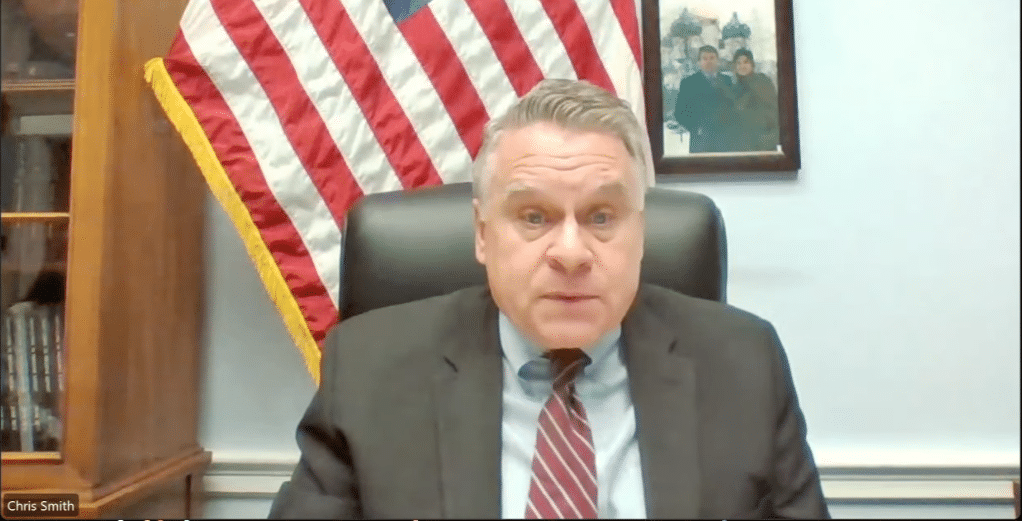VOC Experts Speak at Tom Lantos Human Rights Commission Hearing on Forced Organ Harvesting in China

Today, Rep. Chris Smith chaired a hearing of the Tom Lantos Human Rights Commission on forced organ harvesting in China, for which Victims of Communism Memorial Foundation (VOC) China Studies Fellows, Matthew P. Robertson and Ethan Gutmann, gave expert testimony.
This hearing comes after the release of a groundbreaking VOC report in April which revealed brand new evidence showing how Chinese physicians are complicit in the gruesome practice of organ harvesting. The report was published in the top medical transplant journal in the world, the American Journal of Transplantation, and was co-authored by VOC China Studies Fellow and PhD candidate in political science at Australian National University, Matthew P. Robertson, and Dr. Jacob Lavee, director of the Heart Transplantation Unit at the Sheba Medical Centre in Israel.
“In the developed world, transplant organs come from voluntary donors. Executed prisoners are forbidden from donating their organs. The role of governments is to establish the legal and regulatory framework around ethical voluntary donation. China is unique in several respects—it’s the only country that runs what amounts to a state-sanctioned organ trafficking business out of its hospitals while systematically using prisoners as the almost sole source of organs over many decades. Since 2015, authorities say they’ve stopped the practice, but there are good reasons to doubt these claims,” said Matthew Robertson.
Robertson continued, “The paper published last month in the American Journal of Transplantation deals with the involvement of surgeons in heart procurement operations from prisoners…we found 71 papers giving explicit descriptions of surgeons appearing to violate the dead donor rule while procuring hearts from prisoners… The papers appear to show that the donors, who are prisoners, were alive at the time of the surgery and were killed by the transplant surgeons in the process of heart extraction.”
VOC China Studies Fellow, Ethan Gutmann, who has interviewed over 20 witnesses of China’s human rights abuses in the past three years alone, provided shocking estimates that 25,000 to 50,000 camp detainees in China are harvested each year for two or three organs, amounting to an annual transplant industry of somewhere between 50,000 to 150,000 organs. He shared findings he has uncovered during witness interviews that the Chinese government most commonly forcibly harvests organs from political prisoners and prisoners of conscience who are around the ages of 18 and 28. Mr. Gutmann explained that it is commonly announced at the camps during lunchtime that detainees are “graduating,” after which they are never seen again
“What compounds the shock to the conscience is not simply the execution of people declared enemies of the state, as if on order to provide certain organs to meet transplant needs, but that this is also an apparent form of punishment, and indeed a tool of genocide meant to cull minority populations deemed ‘undesirable’ by the State,” said Rep. Smith, who last year introduced the Stop Forced Organ Harvesting Act (H.R. 1592) to establish measures to prevent the cruel practice and the international trafficking of persons to remove their organs.
Other experts and witnesses provided testimony as well, including Sir Geoffrey Nice QC, chair of the independent people’s “China Tribunal,” ex-CCP surgeon Dr. Enver Tohti, and Robert A. Destro, Assistant Secretary for the Bureau of Democracy, Human Rights, and Labor (DRL).
The authoritative China Tribunal judgement, chaired by Sir Geoffrey Nice QC, has documented that many of the condemned are political prisoners and prisoners of conscience. During the hearing, Sir Geoffrey highlighted that the independent tribunal he chairs has found that “forced organ harvesting has been committed for years throughout China on a significant scale and that Falun Gong practitioners have been one—and probably the main—source of organ supply.”
Dr. Enver Tohti, ex-CCP surgeon, shared his testimony about how he was instructed to conduct forced organ harvesting while practicing medicine in China. “I felt chilling, even in the hot summer,” he described of his first experience being instructed to remove organs from a prisoner who had just been executed by gun shot. “The whole operation took around 30-40 minutes, chief surgeons happily put those organs into a weird looking box, and said that: ok, now you take your team back to hospital; remember nothing happened today,” said Dr. Tohti.
Mr. Gutmann noted that while the practice occurs in China, the global community has enabled the horrific practice, “This catastrophe was created by Beijing, yet it was continuously enabled by a handful of Western doctors who thought they could ride the Chinese dragon and come back home as if everything was normal.”
These findings have dire implications for not just the transplant healthcare system in China, but for the world. China’s increasing influence on world healthcare institutions, and its record of lack of openness, misinformation, and falsification, means that doctors in the West may unknowingly become implicated in covering up Beijing’s illegal organ harvesting atrocities.
Assistant Secretary for Democracy, Human Rights, and Labor, Robert Destro, added, “What incentives are there for diplomats to raise this difficult issue, or, in the short term, to spend time and precious political capital reporting on the nature and extent of the problem? I submit to you that there is very little incentive. It is far easier to be willfully blind than to ask hard questions.”

